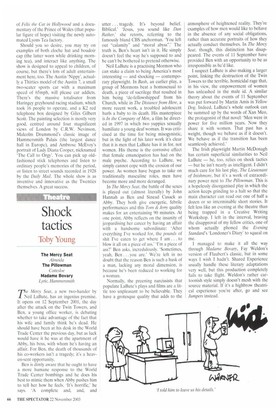Shock tactics
Toby Young
The Mercy Seat Almeida
The Pillowman ( ottoloe
Madame Bovary Lyric, Hammersmith
pie Mercy Seat, a new two-hander by / Neil LaBute, has an ingenius premise. It opens on 12 September 2001, the day after the attack on the Twin Towers, and Ben, a young office worker, is debating whether to take advantage of the fact that his wife and family think he's dead. He should have been at his desk in the World Trade Center the previous day, but as luck would have it he was at the apartment of Abby, his boss, with whom he's having an affair. For Ben, the death of thousands of his co-workers isn't a tragedy; it's a heaven-sent opportunity.
Ben is dimly aware that he ought to have a more humane response to the World Trade Center bombings and he does his best to mimic them when Abby pushes him to tell her how he feels. 'It's horrific,' he says. 'A complete and, and, and
utter .. . tragedy. It's beyond belief. Biblical."Jesus, you sound like Dan Rather,' she retorts, referring to the famously bland CBS anchorman. 'You left out "calamity" and "moral abyss".' The truth is, Ben's heart isn't in it. He simply doesn't feel the way he's supposed to and he can't be bothered to pretend otherwise.
Neil LaBute is a practising Mormon who can stake a claim to being America's most interesting — and shocking — contemporary playwright. In Bash, an earlier play, a group of Mormons beat a homosexual to death, a piece of sacrilege that resulted in him being 'de-fellowshipped' from his Church, while in The Distance from Here, a more recent work, a troubled adolescent hurls a baby to its death. His masterpiece is In the Company of Men, a film he directed in 1997 in which two yuppies sexually humiliate a young deaf woman. It was criticised at the time for being misogynistic, but in the light of his later work it's clear that it is men that LaBute has it in for, not women. His theme is the corrosive effect that female emancipation has had on the male psyche. According to LaBute, we simply cannot cope with the erosion of our power. As women have begun to take on traditionally masculine roles, men have become more and more deranged.
In The Mercy Seat. the battle of the sexes is played out (almost literally) by John Hannah as Ben and Sinead Cusack as Abby. They both give energetic, febrile performances and this Tom & Jeny quality makes for an entertaining 90 minutes. At one point, Abby reflects on the insanity of jeopardising her career by having an affair with a handsome subordinate: 'After everything I've worked for, the pounds of shit I've eaten to get where I am. . . to blow it all on a piece of ass.' I'm a piece of ass?' Ben asks, incredulously. 'Sometimes, yeah, Ben ... you are.' We're left in no doubt that the reason Ben is such a husk of a man, lacking any moral dimension, is because he's been reduced to working for a woman.
Normally, the preening narcissists that populate LaBute's plays and films are a little too unpleasant to be believable. They have a grotesque quality that adds to the
atmosphere of heightened reality. They're examples of how men would like to behave in the absence of any social obligations, rather than accurate portraits of how they actually conduct themselves. In The Mercy Seat, though, this distinction has disappeared. The events of 11 September have provided Ben with an opportunity to be as irresponsible as he'd like.
I suspect LaBute is also making a larger point, linking the destruction of the Twin Towers to the terrible, homicidal rage that, in his view, the empowerment of women has unleashed in the male id. A similar theory about the events of 11 September was put forward by Martin Amis in Yellow Dog. Indeed, LaBute's whole outlook can be summed up by the words of Xari Meo, the protagonist of that novel: 'Men were in power for five million years. Now they share it with women. That past has a weight, though we behave as if it doesn't. We behave as if the transition has been seamlessly achieved.'
The Irish playwright Martin McDonagh has certain superficial similarities to Neil LaBute — he, too, relies on shock tactics — but he isn't nearly as intelligent. I didn't much care for his last play, The Lieutenant of Inishmore, but it's a work of extraordinary power next to The Pillowman. This is a hopelessly disorganised play in which the action keeps grinding to a halt so that the main character can read out one of half a dozen or so interminable short stories. It felt less like an evening at the theatre than being trapped in a Creative Writing Workshop. I left in the interval, braving the disapproval of my fellow critics, one of whom actually phoned the Evening Standard's 'Londoner's Diary' to squeal on me.
I managed to make it all the way through Madame Bovril'', Fay Weldon's version of Flaubert's classic, but in some ways I wish I hadn't. Shared Experience usually handle these literary adaptations very well, but this production completely fails to take flight. Weldon's rather cartoonish style simply doesn't mesh with the source material. If it's a highbrow theatrical experience you're after, go and see Jumpers instead.


























































































 Previous page
Previous page